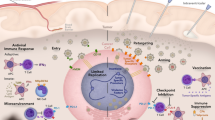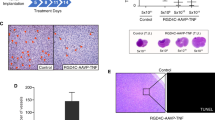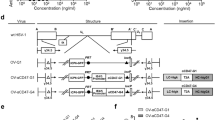Abstract
This report describes a test of the hypothesis that the oncolytic effect of genetically engineered, replication competent herpes simplex viruses (HSV) depends both on cell destruction by the virus and an immune response to the tumor cells induced in an immunocompetent animal system. The oncolytic vector was a HSV recombinant virus in which both copies of the γ134.5 gene were replaced with the murine genes encoding the cytokine interleukin-4 (IL-4) or interleukin-10 (IL-10). The hypothesis predicted that if an immune response plays a role in survival following intratumoral treatment of tumor-bearing animals with HSV, expression of IL-4 should prolong survival whereas expression of IL-10 should reduce it. The results are that (1) these cytokines can be expressed by HSV in productively infected cells both in vitro and in vivo; (2) HSV-expressing IL-4 or IL-10 genes were able to infect and destroy glioma cells in vitro; (3) intracerebral inoculation of HSV expressing either IL-4 or IL-10 into syngeneic murine glioma GL-261 cells implanted in the brains of immunocompetent C57BL/6 mice produced dramatically opposite physiologic responses. The IL-4 HSV significantly prolonged survival of tumor bearers, whereas tumor-bearing mice that received the IL-10 HSV had a median survival that was identical to that of saline treated controls; (4) immunohistochemical analyses of mouse brains at 3 and 7 days after virus inoculation showed marked accumulation of inflammatory cells composed primarily of macro- phages/microglia, with various proportions of CD8+ and CD4+ T cells, but few B lymphocytes. We conclude that the cytokines expressed from genes encoded in the viral genome influence HSV therapy of tumors and this is probably due to the host immune response. Thus, cytokine expression may be an important adjunct to tumor therapy utilizing genetically engineered HSV.
This is a preview of subscription content, access via your institution
Access options
Subscribe to this journal
Receive 12 print issues and online access
$259.00 per year
only $21.58 per issue
Buy this article
- Purchase on Springer Link
- Instant access to full article PDF
Prices may be subject to local taxes which are calculated during checkout
Similar content being viewed by others
Author information
Authors and Affiliations
Rights and permissions
About this article
Cite this article
Andreansky, S., He, B., van Cott, J. et al. Treatment of intracranial gliomas in immunocompetent mice using herpes simplex viruses that express murine interleukins. Gene Ther 5, 121–130 (1998). https://doi.org/10.1038/sj.gt.3300550
Received:
Accepted:
Published:
Issue Date:
DOI: https://doi.org/10.1038/sj.gt.3300550
Keywords
This article is cited by
-
Advances in NK cell therapy for brain tumors
npj Precision Oncology (2023)
-
Cancer vs. SARS-CoV-2 induced inflammation, overlapping functions, and pharmacological targeting
Inflammopharmacology (2021)
-
Safety and efficacy of oncolytic HSV-1 G207 inoculated into the cerebellum of mice
Cancer Gene Therapy (2020)
-
Advances and potential pitfalls of oncolytic viruses expressing immunomodulatory transgene therapy for malignant gliomas
Cell Death & Disease (2020)
-
An Engineered Herpesvirus Activates Dendritic Cells and Induces Protective Immunity
Scientific Reports (2017)



